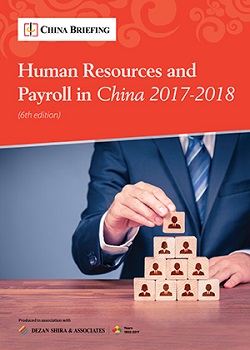Labor Dispatch in China: Definition, Scope, and Limit
Labor dispatch is an alternative option for foreign-invested enterprises (FIEs) looking to hire Chinese staff. While the preparatory work for setting up entities in China may require the assistance of Chinese staff, it is necessary for foreign investors to obtain their local entity’s business license before formally hiring employees. Additionally, a representative office (RO) cannot hire staff directly, and their employees must be seconded from dispatch agencies.
Due to its flexibility and lower cost, labor dispatch has traditionally been one of the most popular ways hire employees in China. Dispatch agencies offer companies temporary workers for particular projects or a certain period of time. This is especially beneficial for businesses in seasonal industries or with project-based work, where the amount of labor needed is not consistent year-round.
Besides, labor dispatch is also attractive for employers because they face fewer risks in the event of a labor dispute. Dispatched laborers are technically employed by their agencies rather than the companies they do work for, so any workplace grievances must be dealt with by the dispatch agency. This is advantageous for companies using labor dispatch, as the risk of a labor dispute is transferred to the agency that provides them with workers. However, it also leaves dispatched workers more vulnerable to exploitation.
Labor dispatch is generally regulated by Section 2 of the PRC Labor Contract Law. And on January 24, 2014, China’s Ministry of Human Resources and Social Security (MOHRSS) promulgated the “Interim Regulations on Labor Dispatch” (MOHRSS Order No. 22, hereinafter referred to as the “Interim Regulations”) to limit companies from taking advantage of labor dispatch. The two regulations restrict what types of positions dispatched staff can hold, the proportion of workers in a company that can be comprised of dispatched staff, and how they are returned to their agencies. Key information about dispatch can be found below.
Applicable scope of labor dispatch
According to the Interim Regulations, labor dispatching arrangements are only applicable for the following three types of positions:
- Temporary position: A position with a duration of no more than six months.
- Auxiliary position: A position that provides auxiliary services to the main or core business of the employer.
- Replaceable position: A position that can be performed by a dispatched employee in place of a permanent employee during the period when such an employee is away from work for study, vacation, or other reasons.
The applicable position type must be specified within the applicant’s dispatch contract.
![]() RELATED: Outsourcing Options for FDI into China
RELATED: Outsourcing Options for FDI into China
10 percent limit
The Interim Regulations stipulate that the number of total dispatched employees used by an employer should not exceed 10 percent of its total number of employees, including regular employees and dispatched employees. ROs of foreign enterprises, however, are not subject to this restriction on dispatched employees’ positions.
In the event that the number of dispatched employees exceeds this limit before the effective date of the Interim Regulations, the employer must reduce the proportion of dispatched staff to 10 percent within two years of the effective date of the provisions. That two year period expired in March, 2016, and so all FIEs, excluding ROs, must now be fully compliant with the new policy.
Contract signing
Labor contract between the dispatch agency and the dispatched employee
According to the Interim Regulations, the contract signed between the labor dispatch agency and the dispatched employee should have a fixed employment term of at least two years. The previous draft allowed non-fixed period labor contracts.
The dispatch agency may arrange a probationary period of employment with the consent of the dispatched employee. However, such probationary periods are only allowed once for each dispatched employee.
Dispatching contract between the dispatch agency and the host entity
The Interim Regulations add several essential items required for drafting the dispatching contract between the dispatch agency and the host entity (i.e. the employer):
- The title and type of the dispatching position (temporary, auxiliary, or replaceable);
- The location of work;
- The number of dispatched employees and the allotted time;
- Payment amount determined in accordance with the “equal pay for equal work” principle;
- The payment method and the amount of social insurance premiums;
- Work hours and vacations;
- The relevant treatment for work-related injury, maternity leave and illness;
- Work safety and hygiene, and other relevant training;
- Financial compensation;
- The valid term of the dispatching contract;
- The payment method and the standard of dispatching service fees;
- The penalty for violating the dispatching contract; and
- Other required items.
Contract between the host entity and the dispatched employee
The contract between the host entity and the dispatched employee is required in every labor dispatching relationship. This contract is regulated by the PRC Contract Law rather than the PRC Labor Contract Law. It is usually used as a supplementary document to clarify the relationship between the host entity and the dispatched employee.
“Equal pay for equal work” principle
The Interim Regulations stipulate that the principle of “equal pay for equal work” is applied to all labor dispatching agreements, meaning that employers should apply the same remuneration standards for dispatched employees as they do for direct-hire employees who hold similar positions, including overtime salaries and bonuses.
Where the employer has not hired any employee holding a similar position, the labor remunerations payable to the dispatched employee should be determined with reference to those payable to employees holding a similar position in the place where the employer is located.
![]() International Payroll & HR Solutions from Dezan Shira & Associates
International Payroll & HR Solutions from Dezan Shira & Associates
Cross-region labor dispatch
Under the Interim Regulations, if a labor dispatch agency dispatches employees to an employer located in another region, the social insurance to be enjoyed by the dispatched employees should be provided according to the rates and standards of the place where the employer is located.
With respect to who makes the insurance payment, if the labor dispatch agency has a branch in the region where the employer is located, the local branch of the labor dispatch agency should pay the social insurance for the dispatched employees; if it does not have a branch in the region, the host entity should pay for the social insurance on behalf of the labor dispatch agency.
Termination of labor contract
The dispatched employee may terminate the labor contract by giving a written notification to the labor dispatch agency 30 days in advance. During the probation period, such notification may be given three days in advance.
The Interim Regulations stipulate that the host entity may return the dispatched staff back to the dispatch agency due to the following reasons:
- Major change in objective circumstances;
- Mass layoffs due to financial difficulties;
- The host entity is dissolved or its operation is discontinued; and
- The term of dispatching contract is due.
If the dispatched employee is returned because of the above reasons, the labor dispatch agency is responsible for redistributing the dispatched employee. The labor dispatch agency may only terminate the employee’s contract if the employee refuses a new dispatch offering equal or greater conditions.
 This article is adapted from “Human Resources and Payroll in China 2017-2018” A firm understanding of China’s laws and regulations related to human resources and payroll management is absolutely necessary for foreign businesses in China. This edition of HR and Payroll, updated for 2017/18, navigates China’s laws and regulations related to HR and payroll management – essential information for foreign investors looking to establish or already running a foreign-invested entity in China.
This article is adapted from “Human Resources and Payroll in China 2017-2018” A firm understanding of China’s laws and regulations related to human resources and payroll management is absolutely necessary for foreign businesses in China. This edition of HR and Payroll, updated for 2017/18, navigates China’s laws and regulations related to HR and payroll management – essential information for foreign investors looking to establish or already running a foreign-invested entity in China.
About Us
China Briefing is published by Asia Briefing, a subsidiary of Dezan Shira & Associates. We produce material for foreign investors throughout Asia, including ASEAN, India, Indonesia, Russia, the Silk Road, and Vietnam. For editorial matters please contact us here, and for a complimentary subscription to our products, please click here.
Dezan Shira & Associates is a full service practice in China, providing business intelligence, due diligence, legal, tax, accounting, IT, HR, payroll, and advisory services throughout the China and Asian region. For assistance with China business issues or investments into China, please contact us at china@dezshira.com or visit us at www.dezshira.com
- Previous Article Hong Kong Account Holders: Prepare for AEOI Reporting
- Next Article Non-profit Organizations in China: How to Apply for Tax Exempt Status






